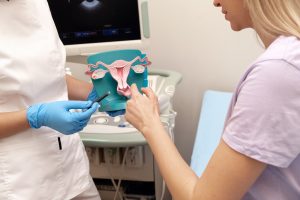The natural progression of a woman’s hormonal changes leads to a phase of life that can be exciting, challenging, confident-inducing and difficult all at once. Menopause has often been thought of as an uncomfortable, inevitable state of declining hormones that women must suffer through in order to get to the other side. What if a paradigm shift was possible that leads to excitement and self-assuredness with the journey of hormonal changes? It is possible, once a clear understanding of menopause and management strategies are achieved.
The Menopausal Transition
A change of hormonal patterns can occur at a wide range of ages. Some women in their 30s may notice mood shifts that are new or have an increase to flow, while others observe these symptoms in their 40s. Perimenopause simply refers to changes in the menstrual cycle and is considered a precursor to menopause. This phase can be long, even up to 10 years in the making, or less than 1 year for others.
Common initial symptoms to recognize are:
- less regular cycles
- changes to flow heaviness or duration
- new or stronger PMs symptoms such as mood swings, sleep disturbances, headaches, bloating, water retention and breast soreness
As hormones change further from baseline, women may experience:
- low libido
- vaginal dryness
- excess heat
- night sweats
- brain fog
- weight gain
Most often, the hormone progesterone declines first and at a faster rate than estrogen. This imbalance between the hormones may be the main cause of perimenopausal symptoms. While it is a natural progression of life, there are ways to minimize discomfort and take control using diet, lifestyle, herbs, nutrients and bioidentical hormones.
Recognizing Menopause
The technical definition of menopause requires a woman to have not had a period in 12 months. Women may experience years of irregular cycles and missed periods or can suddenly stop periods with no warning. Most often, signs of hormonal changes with cycles, heat, insomnia, brain fog, fatigue and or weight gain occur with reduced or different cycles. The average age of perimenopause is 40-44, about 8-10 years prior to the average age of menopause at 50 – 52 years old. Once a woman no longer has a cycle for 1 year, she is also considered to be postmenopausal.
Physical Changes and Symptoms
Body changes are a normal part of hormonal changes. Not all women have all perimenopausal symptoms, but most will feel some changes. The most common symptoms and physical body evolution include:
- Heat – both hot flashes and night sweats
- Sleep – difficulties with fallings asleep and/or staying asleep
- Longer or shorter cycles than normal and changes to flow volume and consistency
- Vaginal dryness
- Bladder control changes – increased frequency and urgency
- Sexual health – libido increases or decreases
- Difficulties with weight loss, redistribution of body mass
- Bone density changes, sometimes alongside an increased risk of osteoporosis
Emotional and Psychological Effects
When hormone levels drop or become unbalanced relative to each other, mental health can be affected. This is sometimes observed in the days leading up to a period or as a constant state and is highly individualized depending on the woman. Some challenges that may arise include:
- Irritability and anger
- Weeping and sadness
- Mood swings between several different emotions
- Difficulties dealing with stress
- Increased tendencies towards anxiety
- Low mood leading to depression
- Memory changes
- Difficulties with thought clarity, often referred to as “brain fog”
Managing Menopausal Symptoms
Recognizing perimenopause and menopause is a great start which takes pressure off of a woman who might continuously question themselves. Acceptance of the changeability and adaptations to the physical and mental wellbeing helps to lower stress-induced emotions. Taking time to lower stress with a walk, reading a good book, talking to a loved one and providing time for healthy sleep patterns can lower some symptoms.
It might be noticed that hot drinks, alcohol and sugar induce hot flashes and night sweats or that higher carbohydrate snacks and meals also bring the heat on. Sticking to a well-rounded, healthy diet with moderation of indulgences can improve heat and sleep. Some women find that changes and improvements to exercise and physical activity lower perimenopausal symptoms and help with stubborn weight loss.
There are a number of supportive therapies that can be used to lower and in some cases resolve symptoms of hormonal transitions to menopause. Herbs, acupuncture, vitamins and minerals and antioxidants can be consumed and depending on the stage of menopause, can give considerable relief of symptoms.
Bioidentical Hormone Replacement Therapy (BHRT)
Hormone replacement therapy (HRT) has been used for decades to alleviate menopausal symptoms. The evolution of the use of hormones to BHRT, or bioidentical hormone replacement therapy, is effective and has helped to lower the risks associated with hormone use. Detailed hormone testing should be completed prior to using BHRT in order to evaluate hormone status and risks with using hormones. These tests use urine analysis to evaluate the metabolic processing of estrogen and other sex hormones. Ideally, BHRT should not be initiated before estrogen metabolism has been tested and results analyzed by a Naturopathic doctor or Medical doctor that has upgraded their education to include BHRT prescribing.
Estrogen is safe when prescribed safely. This hormone is best used as a topical application as opposed to oral and should always be paired with progesterone (orally or topically). With proper monitoring using symptoms and testing, BHRT can be a safe and effective treatment.
It is important to discuss individualized health and family histories with an experienced healthcare provider prior to starting hormonal therapy. In some instances, estrogen therapy is contraindicated and should not be used by some women.
Long-Term Health Considerations
The sex hormones estrogen, progesterone, testosterone and DHEA have many health benefits. Natural decline of hormones begins with perimenopause and this may change the amount of protection against cardiovascular disease, breast changes and bone density decline. REgular physical exams, testing and preventative screening become more important as hormone levels lower.
Menopause and Sexual Health
With a drop in natural hormone production, both sexual desire/libido and sexual function can decline. Menopause is a natural phase of life and communications between partners may help to lower stress and conflict around sexual health.
Vaginal dryness is a common symptom when estrogen levels drop. Vaginal tissue also changes which can make intimate encounters uncomfortable or less pleasurable. Vaginal dryness is often improved with the use of lubrication and BHRT can repair tissue and improve natural secretions to alleviate dryness and discomfort with penetration. With good vaginal health, many women find the menopausal and postmenopausal years extremely pleasurable when it comes to intimacy and sexual desire.
Menopause and Relationships
Women who are more open about their changing hormones and changing bodies may find comfort and understanding from partners, friends and family. Women may even educate those in their circles and learn for themselves what to expect from good books, online communities and supportive groups or therapy. Bonding with others over the changes associated with aging can be helpful and may lead to lessening symptoms with new lifestyles and diets to implore.
Workplace Considerations
Menopause is a natural phase of life, every woman will experience it eventually. Dressing in thin layers that are easy to peel off or put back on will help to cope with the temperature variations that are common. When possible, adjusting the temperature to create a slightly cooler room may diminish the severity of heat when a hot flash comes on. If choosing to use BHRT, these heat extremes can be minimized.
Self-Care Strategies
Stress management can be the most successful lifestyle way to lower the severity of menopausal symptoms. Taking time to allow for pleasure and calming, practicing mindfulness and meditation will lead to the promotion of relaxation. Whether this means taking a spa day, a forest walk, a lunch with good friends or reading a fantasy novel at the beach, choosing the right approach is an individualized task. Stress relates to hormones and hormones circle back to the stress response.
Healthy Aging Beyond Menopause
Postmenopause can be the most enjoyable phase of life. No more periods, hormonal headaches, mood swings and temperature swings! A sense of self-awareness can naturally arise after observing the changes that occur with hormonal changes. A focus on overall health and well-being should be part of regular routines, culminating in exercise, leisure and healthy sleep patterns. Explorations of new opportunities and following passions and goals are part of life at any stage.
Perimenopause and menopause are natural progressions in a woman’s life beginning in the late 30s and early 40s. Understand that the symptoms and changes are normal and can be supported with lifestyle, diet, supplements and BHRT to minimize discomfort. Visiting a medical professional that is well trained and experienced in this phase of life can help to answer questions, prevent severity of symptoms and help to make this stage of life enjoyable.
Frequently Asked Questions
While menopause can start any time in the 40s, the average age is 50-52 years old.
This is different for every woman. It can be 1 year, a few years or a decade. There is often a familial pattern and asking mothers and older sisters may help to give a guideline.
Yes, many. Taking herbs, especially in early stages, can significantly reduce symptoms. Not all supplements and herbs will work for all women but there are a variety of options to try.
There are alternatives such as herbs, acupuncture and nutritional or dietary changes that can help reduce menopausal symptoms. It is best to discuss individual options with a naturopathic doctor that works with hormones.
Yes. Menopause signals the decline in hormones to a level that does not promote pregnancy.
Some women experience anxiousness and low mood when approaching menopause. The change in hormones may also lead to a lowered stress tolerance, mood swings and irritability.
Yes. As the body adjusts to lower levels of hormones, there are still times when levels will spike back to normal. If ovulation is able to occur, pregnancy may also occur. This is rare, but still possible.









